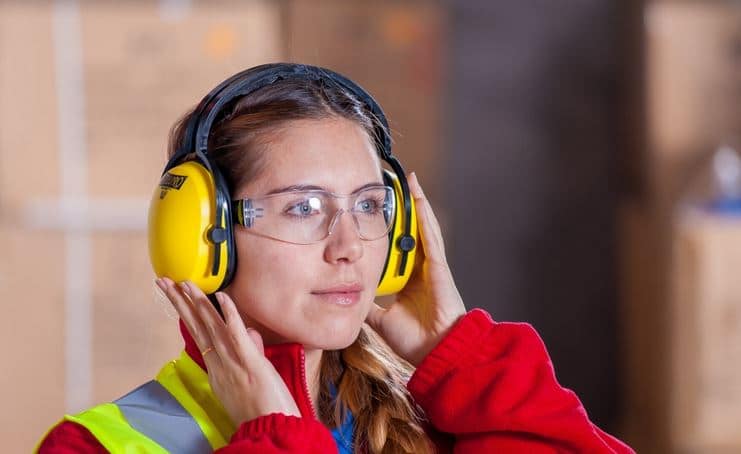by Alyson McBride
As an invisible sense, hearing is not something we often don’t pay much attention to until something drastic happens. Only when we experience overly loud sounds do we cover our ears or reach for those little foam ear plugs. On a day to day basis, many of us stream music and podcasts from earbuds on our commutes and during workouts.
Hearing is a sense many of us take for granted because it is always on.
Hearing loss is the third most common medical condition in the United States. While it is often thought of as a condition that affects older people, the reality is that any one, at any age, could experience hearing loss. While age-related hearing loss (presbycusis) may not be preventable, noise-induced hearing loss, on the other hand, is almost always preventable if we take steps in our daily life to protect our hearing.
Because there is no singular cause for hearing loss, there is no single solution to preventing it. Here are a variety of ways you can prevent hearing loss in your everyday activities.
Turn Down the Volume
These days, personal electronic equipment is portable and offers long-lasting battery life. Combined, these two factors make it easier for us to listen to music and media at high volumes, for longer periods of time.
Make the switch from earbuds to noise-canceling headphones. Earbuds are harmful to our hearing: their positioning close to our eardrums creates dangerously loud conditions – much louder than the volume displayed on your devices. Earbuds don’t do a great job at blocking out background noise, which means people tend to turn up the volume in order to hear their music and block out extraneous sounds. Noise-canceling headphones block out background noise, which means you can keep volume levels lower.
Look for apps that control volume levels on your phone. You can set a limit and receive notification if your volume levels exceed the recommended amount. Also, there are apps that measure decibels in the environment you’re in. When you can see a visualization of decibel levels rising to dangerous heights, you’ll be more motivated to move to a space that is quieter.
Overall, a huge preventative step is to simply turn down the volume. Hearing specialists recommend the 60-60 rule of listening: 60% volume for no more than 60 minutes at a time.
Another Great Reason to Quit Smoking
Sure, everyone knows the countless health risks of smoking cigarettes, from lung cancer to heart disease. Would it help you quit if you knew that hearing loss may also result from smoking? Studies show that 70% of smokers are more likely to develop hearing loss than nonsmokers. Second-hand smoke also contributes to hearing loss.
How is it that cigarette smoking is related to hearing loss? Chemicals found in cigarettes, such as nicotine, hydrogen cyanide, formaldehyde, arsenic, and ammonia, can damage your body’s oxygen levels and blood vessels. Studies have also indicated that nicotine could harm neurotransmitters in the auditory nerve, which could lead to hearing loss.
At the same time, cigarettes create other health conditions that could increase the risk for hearing loss, such as high blood pressure. The intricate environment inside your inner ear, where sound is processed into neural signals, relies on a healthy supply of oxygenated blood to function properly.
High blood pressure, a side-effect of smoking cigarettes, could interfere with this, possibly leading to sensorineural hearing loss.
For life-long smokers, quitting smoking seems pointless after a certain age. However, it is important to note that it is never too late to quit – and that there are almost immediate health benefits to quitting smoking today.
Custom Hearing Protection
Whether you’ve got season baseball tickets or play in an amateur garage rock band, there is always more you can do to protect your hearing. In our leisure activities, we often inadvertently expose ourselves to dangerously loud noise levels. Live sporting events and live rock shows can reach 110 decibels – almost as loud as a jet engine taking off. In just a few minutes, sounds at this level could lead to permanent noise-induced hearing loss.
Custom hearing protection is made from a mold of your ear canals, which provide you with a comfortable fit – unlike generic foam earplugs that may be uncomfortable during extended use. For the music lover or the hunter, custom hearing devices still allow you to hear the sounds you require to enjoy your activities.
There are custom hearing protection options for almost any activity, from swimming, to music performance, to shooting, to general use for mowing the lawn.
Visit your local audiologist or hearing specialist to have a pair custom-made for you.
Monitor Your Blood Sugar Levels
Hearing loss and diabetes may share more than being the most common medical conditions in the US. According to the American Diabetes Association, “Nearly 30 million people in the U.S. have diabetes, and an estimated 34.5 million have some type of hearing loss. Those are large groups of people, and it appears there is a lot of overlap between the two.” While studies linking diabetes and hearing loss are still nascent, researchers have initial explanations.
In a piece for Diabetic Living Online, Joanna Rinker of the North Carolina Diabetes Prevention and Control Branch theorizes that when there is a spike in blood sugar levels, “there is a breakdown of nerves in the ears – the same kind of nerve damage that causes tingling and other symptoms in the fingertips and toes. When blood sugar is high, blood running through the veins is like syrup. Imagine how hard it is to get into the tiny capillaries of the cochlea – that can contribute to the hearing problems.”
Dr. Elizabeth Dinces, assistant professor of otolaryngology at Montefiore Medical Center in New York, agrees:
“Our hearing mechanisms rely on specialized cells called hair cells. They are very fragile and susceptible to changes in the environment, including the effect of increased glucose in blood.”
For people with diabetes, the American Diabetes Association recommends looking out for the signs of hearing loss, such as turning up the volume or asking people to repeat themselves. Furthermore, monitoring and maintaining your blood sugar levels can help reduce the effects of diabetes on hearing loss. Healthy lifestyle practices, such as regular exercise and quitting smoking, will support healthy circulation, which could also help counteract the effects of diabetes on your hearing abilities.
 Alyson McBride is the Customer Success Manager at HearStore. With a strong background in customer service and call center management, Alyson has led HearStore’s customer success team since its inception in 2017. Helping people find more affordable hearing care is what motivates Alyson to help provide the best service possible.
Alyson McBride is the Customer Success Manager at HearStore. With a strong background in customer service and call center management, Alyson has led HearStore’s customer success team since its inception in 2017. Helping people find more affordable hearing care is what motivates Alyson to help provide the best service possible.






